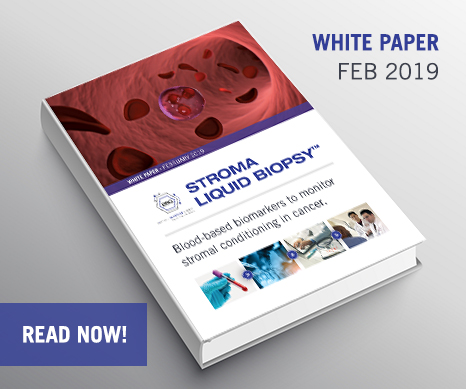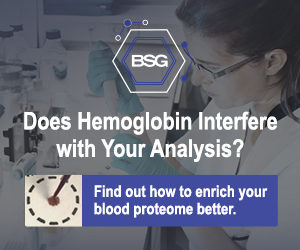Come Meet Us at The 26th International Molecular Med TRI-CON ConferenceBiotech Support Group will exhibit at the annual Molecular Med TRI-CON Conference, March 11-14, 2019 in San Francisco, CA. The conference is a premier event in the Molecular Medicine and Diagnostics field, and highlights the most recent advancements in Digital Health, Liquid Biopsy and Immuno-oncology. The expected attendance of 3,700 brings together senior level executives, directors and scientists within pharmaceutical companies and oncology-focused institutions and organizations. Featured at Booth 337, will be a patent pending cancer biomarker panel – Stroma Liquid Biopsy™, commercialized through partnerships, and consumable sample prep products for blood proteome enrichment. Simply click on the image to learn more about our featured products. In addition, there will be two technical poster reports: The first is entitled " New Cancer Therapeutic Strategies are Proposed Based on Evidence from Stroma Liquid Biopsy™ Biomarkers", co-authored with collaborators from Vanderbilt University. AbstractTumors are more than simply a collection of immortalized cells as the supporting microenvironments or stroma also contributes to pathogenesis. Because of this, tumor characterization cannot be fully characterized solely through the analyses of the tumor cell genome – the current emphasis of liquid biopsy platforms. So because tumors are more than just a mass of proliferating cells, cancer progression must take into consideration the influence of the multiple cell types and networks of proteins dynamically interacting in active tumorigenesis. These are not simply passive bystanders. The unique significance of the Stroma Liquid Biopsy™ pan-cancer profile is that dysregulation was categorically intertwined with the most rudimentary needs of cancer: space, nutrients and immune evasion. Moreover, the changes within the 13 biomarker panel all occur within an interdependent network of cascading proteolytic events. Because proteolysis is irreversible, all species of life have evolved molecular regulatory systems to control aberrancies. The most distinguished is a protease inhibitory family of regulators known as SERPINs. Although SERPINs circulate in a variety of functional on/off sub-forms, conventionally they are observed and reported in aggregate (i.e., ELISA). As a result, their influence on disease is missed. Using assays that directly assess SERPIN function, rather than antigen presentation, we now have evidence that there is an imbalance of functional SERPIN sub-forms in the cancer population relative to that of a normal population. Consequently, new insights will be extracted into the opportunistic mechanisms that drive cancer pathogenesis and metastatic dissemination, and we advance how those might be unwound therapeutically to improve survival. The second is entitled " AlbuVoid™ Enrichment & Antibody Depletion – Tackling the Challenges of Serum Proteomics Part II", co-authored with collaborators from the Rutgers Proteomics Center. AbstractProteomic workflows that support serum proteomics can be especially challenging for two reasons: 1) the presence of highly abundant proteins, Albumin alone accounts for about 50% of the total protein mass, and 2) a particularly proteolytic resistant sample type due the large concentration of antibodies present. Many proteomic enrichment strategies employ the use of immuno-affinity depletion to remove one or more high abundance proteins. Some common limitations of immuno-affinity however are high costs, regeneration requirements which may result in a diminished and inconsistent performance, as well as a required marriage of species to antibody. Because of these limitations, researchers need ways to enrich differently. We have previously reported a variety of tools that can bias towards or against select sub-proteomes of serum without the use of immuno-affinity. Now we report the serum proteome bias characteristics of AlbuVoid™ & NuGel™ Protein A, alone or in serial combination, using LC-MS reporting metrics. Products and digest conditions produce different proteome qualitative and quantitative windows of observation. For biomarker discovery, we solicit the value for enrichment of categorical sub-proteomes to provide mechanistic insight into disease pathologies. For this, a knowledgebase of over 1000 serum proteins is now available to help proteomic researchers choose the best available products and methods for their particular needs. For more information, please contact Matt Kuruc, mkuruc@biotechsupportgroup.com, 732-274-2866 |

- About
- Products
- Hemoglobin Removal Kits
- Lipid Removal & Clarification
- Urine Protein & Low Abundance Enrichment
- Class Specific Enrichment
- Sample Prep Mass Spectrometry
- Functional & Chemical Proteomics
- Genomic Sample Prep
- Accessories
- Technical Resources
- References
- Publications & Reports
- FAQs
- Case Studies
- Cleanascite™ Unlocks Insights into Lipid-Driven Tumor Immunosuppression
- NRicher™ Bead Platform Provides Unique Sub-Proteome Biases And Fit For Purpose Opportunities for Targeted LC-MS Quantification
- BSG Products To Assist in Analyzing Macrophage Polarization
- Ectodomain Shedding and Enrichment of the Soluble Membrane Proteome
- Investigate out of the Venn Diagram box
- Methods to selectively deplete or purify Hemoglobin from Dried Blood Spots (DBS)
- The Utility of HemoVoid™ is Demonstrated in 3 Proteomic Investigations Identifying Potential Disease Specific Biomarkers
- The 4 common features of our sample prep products, known as the BSG Advantage, are highlighted in a selection of journal references.
- AlbuVoid™ Workflows Advance Cell Secretome Proteomics
- Lipid Removal for Phenotypic Cell Response in Cancer Research
- The Influence of Sample Prep Bias on LC-MS Targeted Peptide Quantification in Serum Proteomics
- Re-imagining proteomics for developing precision medicine biomarkers of the innate immune response in SARS-CoV-2
- Patent Application Describes New Proteomic Methods to Monitor Protease Inhibitor Function During Covid-19 Infections
- Efficient Hemoglobin Removal Advances Red Cell Proteomics Offering Many New Insights Into Inflammation and Infectious Disease
- The Potential for New Blood Biomarkers in the Management of COVID-19 Disease
- Establishing the Utility of HemoVoid™ and HemogloBind™ as Enrichment Tools for Proteomic Analysis of Red Cells and Whole Blood in Parkinson’s Disease
- Species Diversity Supported By BSG Products
- Poster Report Describes Loss of Functional Serpin Activity In Cancer Patient Blood
- AlbuVoid™️ PLUS & AlbuSorb™️ PLUS Evaluating Different Windows of Observation Solves The Many Challenges of Serum Proteomics
- Tackling the Challenges of Serum Proteomics
- Lipid Removal Sample Prep for Cell Response Applications
- Sample Prep for Proteomic Analysis of Saliva
- Biotech Support Group Featured in Book, "Functional Proteomics – Methods and Protocols"
- Sample Prep Liquid Biopsy Products Suitable for Proteomic Profiling of a Variety of Body Fluid Sample Types
- Albumin and High Abundance Depletion
- Using HemogloBind™ as a Hemoglobin Binding Reagent
- Diverse technologies available for researchers to selectively bind or enrich exosomes and extracellular vesicles.
- Stroma Liquid Biopsy™ Biomarkers Profile Pan-Cancer Dysregulation of the Serum Proteome
- Diverse Depletion and Enrichment Technologies Enhance Simplicity and Efficiency of Obtaining Quality Proteomic Information
- Use On-Bead Digestion to Improve Time Required for Serum Digestion
- Using AlbuVoid™ as a Serum Protein Enrichment Kit in Functional Proteomics
- Using Cleanascite™ as a Lipid Absorption and Clarification Reagent
- Using HemoVoid to Remove Hemoglobin Before Analysis
- Blog
- Contact
- Liquid Biopsy

